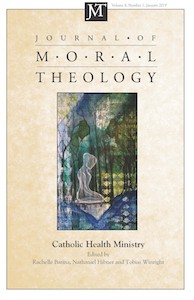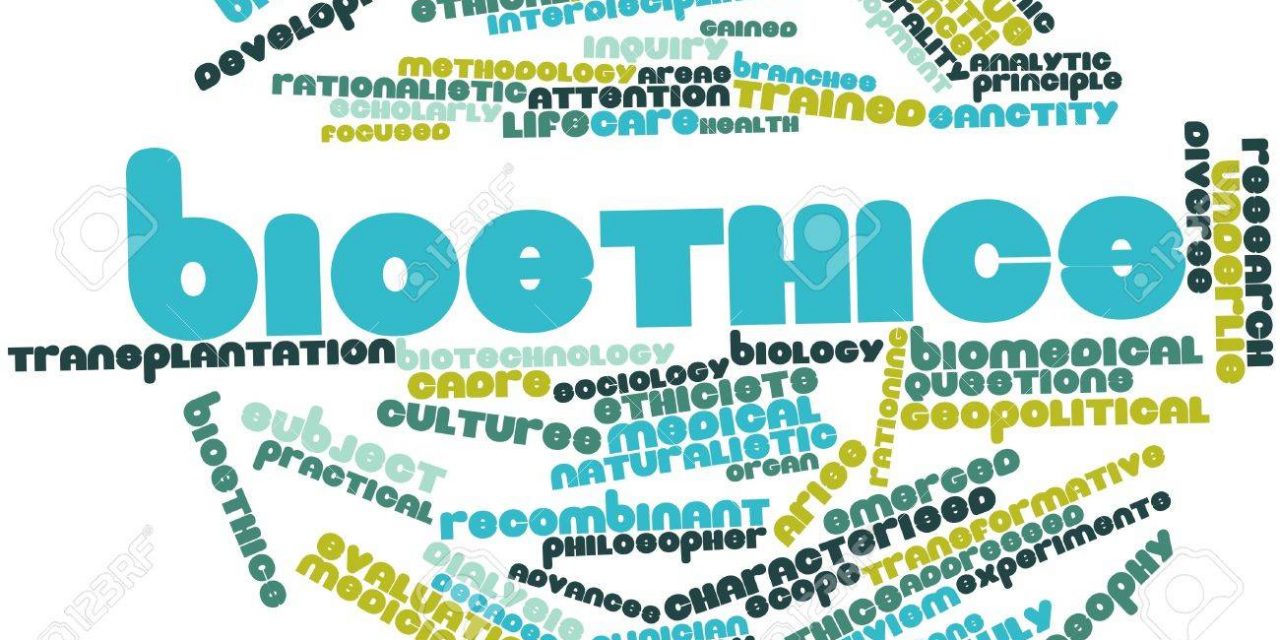Catholic moral theologians, such as Richard McCormick, S.J., were among the pioneers of 20th-century medical ethics and bioethics. A lot has happened during the subsequent decades, and it seems that moral theologians today are not associated as much, if at all, with the field of Catholic health care. But the need remains, and the demand may even have increased, for Catholic moral theologians to turn their gaze to this area that ultimately includes and affects us all one way or another, even if only as patients.
Rachelle Barina, Nathaniel Hibner, and I have co-edited (with the much appreciated efforts of editor Jason King) the latest issue of the Journal of Moral Theology (vol. 8, no. 1; January 2019), which may be freely accessed in the above embedded link. In it, we have brought moral theologians and health care ethicists together to explore current topics in Catholic health care ethics. Catholic health care organizations have grown into ministries of unprecedented size, complexity, and power, and the ethicists and mission leaders that they employ are enmeshed in clinical and organizational questions that have theological importance. Throughout the development of organized U.S. health care, moral theologians have been fruitfully engage d in scholarship and dialogue about medico-moral matters, and moral theologians have moved between the academy and mission and ethics roles in health ministry. In bringing scholars and ethicists together, this issue explores the evolution of their relationship and opportunities to further partner in serving the Catholic moral tradition and the church’s health ministry. It also includes a number of essays that are of topical relevance to the changing health care landscape today.
d in scholarship and dialogue about medico-moral matters, and moral theologians have moved between the academy and mission and ethics roles in health ministry. In bringing scholars and ethicists together, this issue explores the evolution of their relationship and opportunities to further partner in serving the Catholic moral tradition and the church’s health ministry. It also includes a number of essays that are of topical relevance to the changing health care landscape today.
As editors, we hoped that this issue would include papers from both moral theologians and health care ethicists, and we did achieve some balance (although we wish we had more balance with regard to the gender of authors, as well as experience and seniority). The issue opens with two papers that explore the roles of each group and the opportunities to partner together, one written by moral theologian Paul Wojda and the second by ethicist Becket Gremmels. The issue continues with four papers that explore topics of moral significance in Catholic health ministry: Cory Mitchell and Therese Lysaught on residential segregation, Michael Panicola on the impact of mergers and acquisitions, Ramon Luzarraga on prosperity theology, and Conor Kelley on global solidarity in end of life decision-making. Finally, the issue concludes with papers from Michael McCarthy and Darren Henson, both of whom assess the current professional landscape and point towards the vast opportunities for theologians to contribute to health ministries. On the whole, we hope that this issue will increase our mutual interest in and understanding of one another.
We also want to note some of the shortfalls we experienced in the process of collecting these essays. First, we were not overwhelmed by a large number of submissions or vast amount of interest in writing for this issue. Perhaps this substantiates the need for dialogue and increased collaboration that prompted us to organize the issue in the first place. We hope that this issue might encourage more interest in health ministry during the vocational exploration of theologians as well as more literature that engages Catholic medico-moral matters and moral questions about health care systems and organizations.
Second, some topics we hoped to include were not covered. For example, we hoped to include an in depth examination of the importance and necessary scope of theological training for mission/ethics leaders in health ministry. We also hoped for interest in the topic of academic freedom and the roles of academic theologians and Catholic health care leaders in negotiating controversial moral matters. There has long been discussion about the role of theologians in controversial moral matters, but there is no scholarship on the experiences of ethicists and mission leaders, whose writing is sometimes being constrained or censored. There is need for further discussion about how academic theologians and ethicists might collaborate on ensuring there is a healthy level of theological discourse and scholarship on the controversial moral matters that ethicists are often experiencing in real time, long before broader discussion in the public or church.
As a final note, we want to be so bold as to acknowledge that in our personal experiences as well as in discussing this special issue with both theologians and mission/ethics leaders, we have been surprised by the strong sentiments held by some members in each group about the other. We sense a suspicion from some theologians about whether the academic and practical work of Catholic health care ethics is in fact a rigorous application of the theological tradition. We also have encountered more than a few ethicists who criticize moral theologians for not being more engaged in Catholic health ministry or more attuned to the practical realities of clinical care, organizational affairs, and health policy. Neither point was made explicitly in any of the articles, but these sentiments loom in subtle, unspoken, yet influential ways in perceptions of theologians and health care mission/ethics leaders. These sentiments illustrate the need for ongoing dialogue so that each group can understand and support the work of the other. The two roles are different ways of living the vocation of the theologian, and both are important in the life of a healthy and vibrant church that has large educational and healing ministries.
As theologians and mission/ethics leaders, we all have our existing interests and commitments, and we all tend to remain focused in those areas where we are comfortable and knowledgeable. Catholic universities, starting with theologians, and Catholic health ministry, starting with mission/ethics leaders, have an opportunity to improve and maximize our collaboration. The opportunities are vast, stemming from university programs preparing people for health professions, the many PhD trained theologians who struggle to find adequate employment, and the sincere challenges of health care today that would benefit from the attention of people committed to social justice and the common good. Catholic universities and health ministries can support and feed one another, ensuring a vibrancy in our intellectual traditions as well as our service traditions.
As theologians and mission/ethics leaders, let’s lead the way with this collaboration in shared service of our Catholic moral and social vision. One place, for example, where such contributions can occur is the quarterly Health Care Ethics USA, published by the Catholic Health Association (and for which I am associate editor). We invite article submissions from both health care ethicists in the field and from Catholic moral theologians (and, like America, Commonweal, First Things, and others that reach a large audience, we provide remuneration)!




